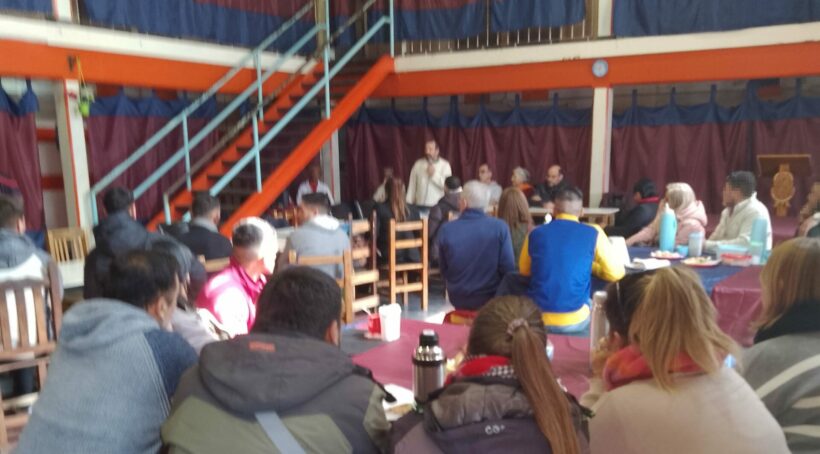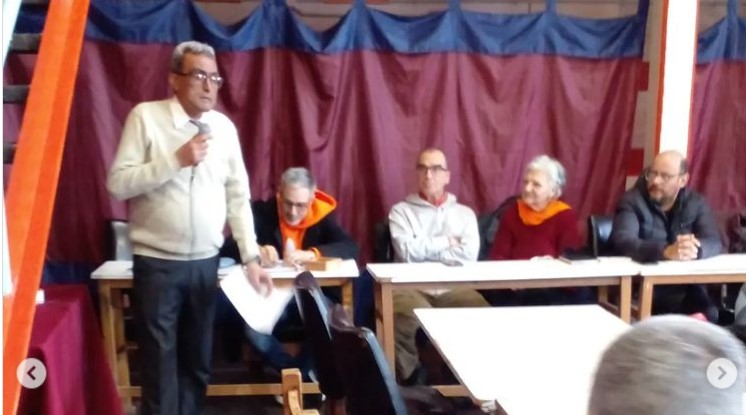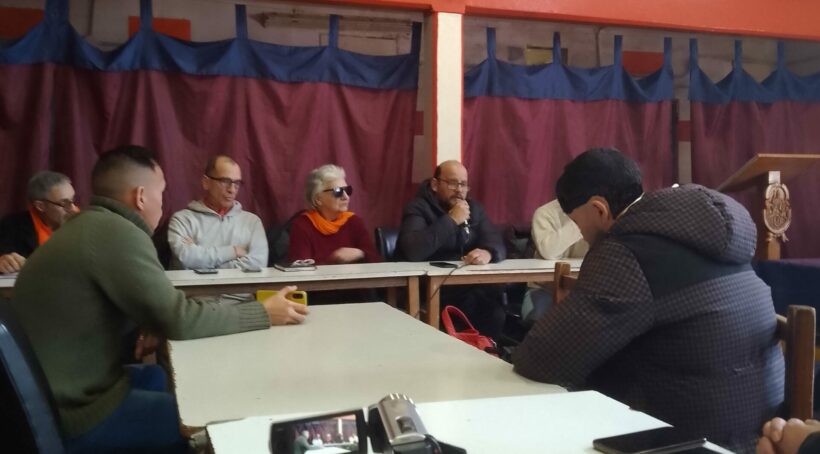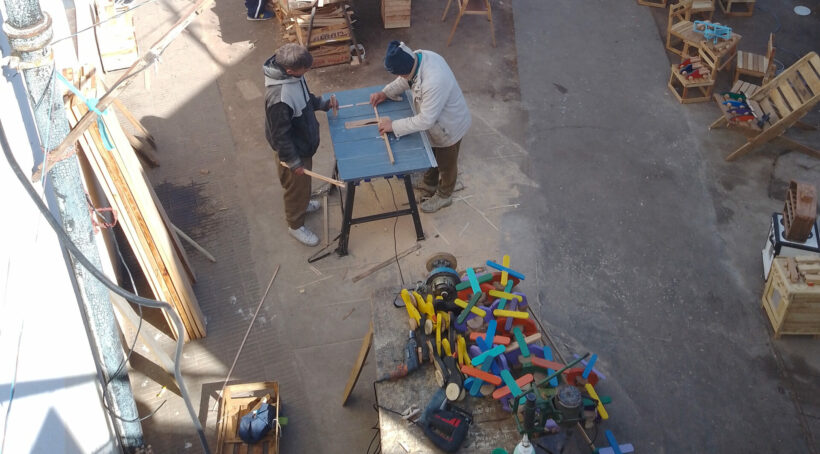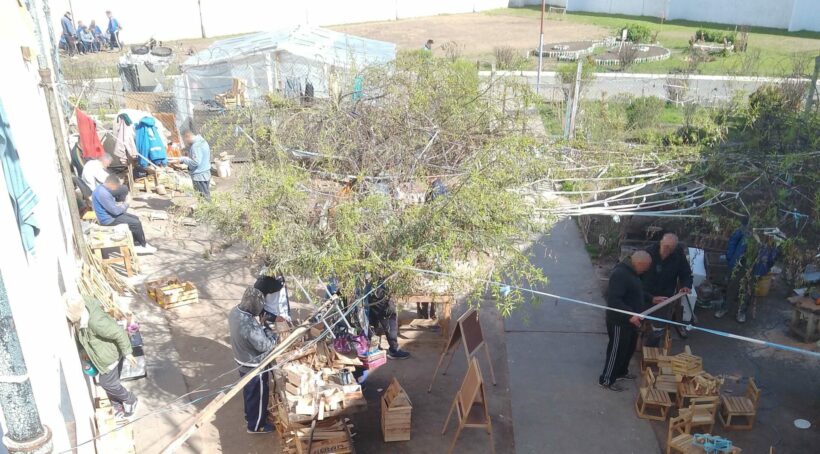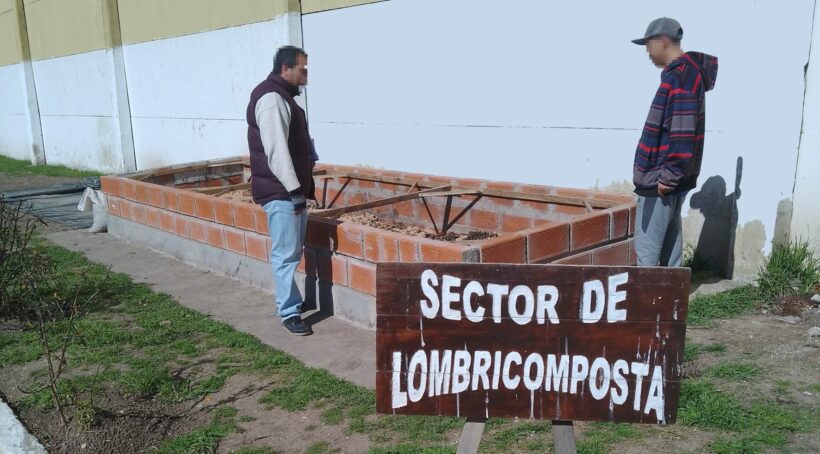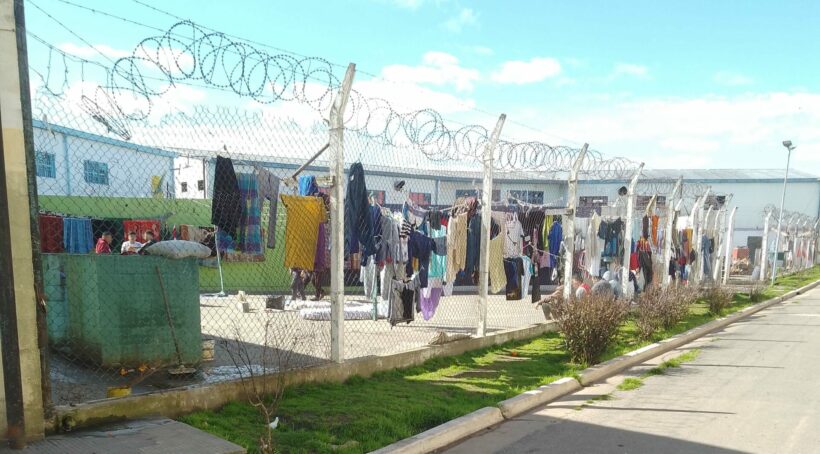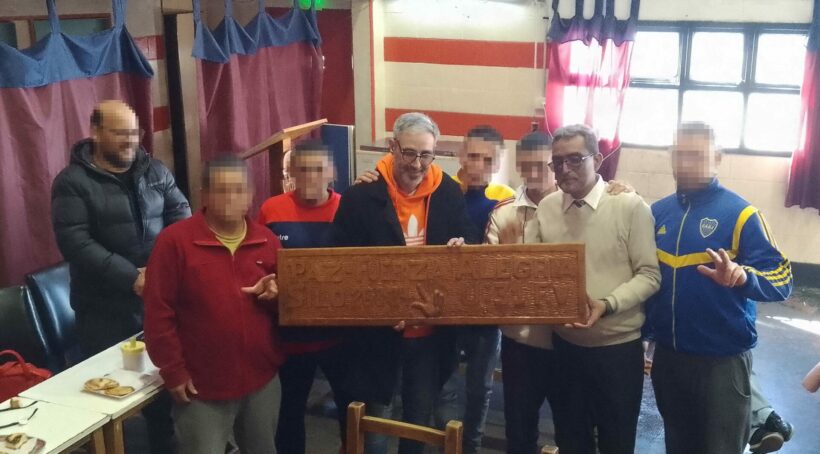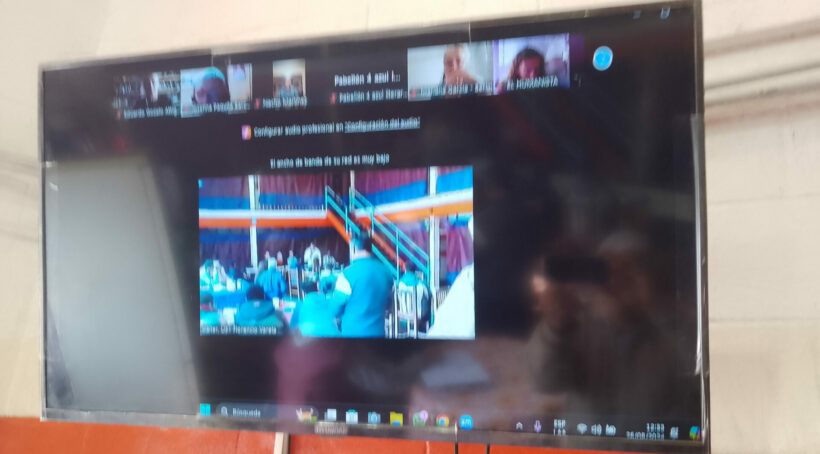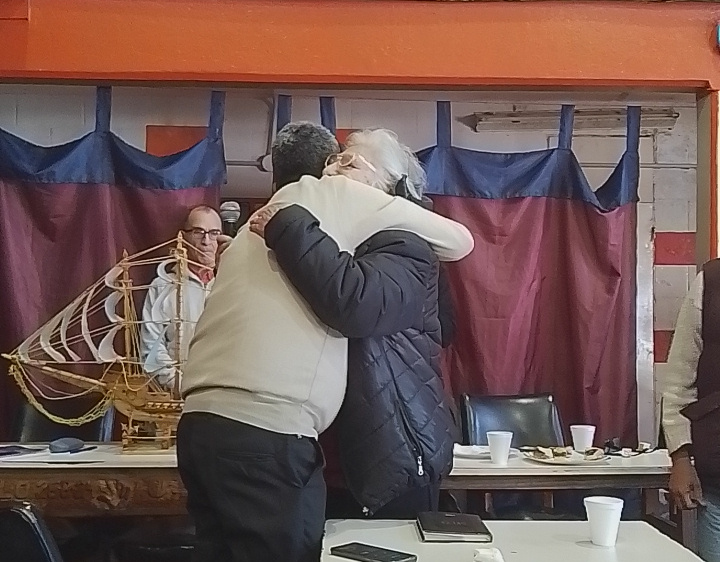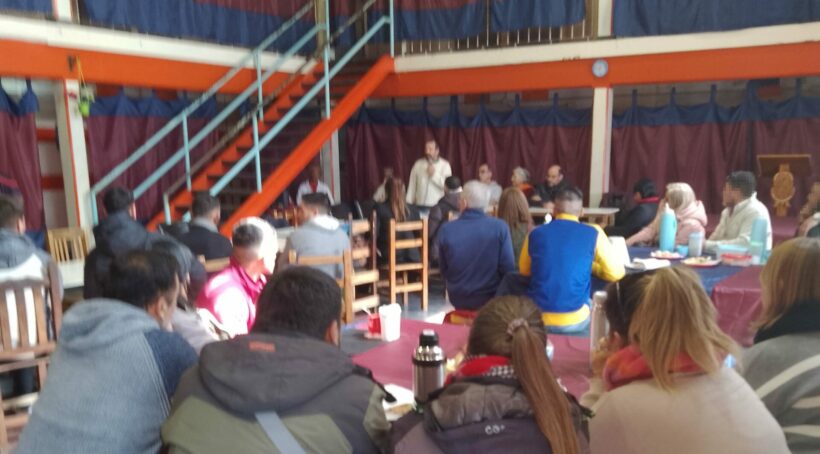On August 26, the First Humanist Congress was held in the prisons of Buenos Aires, organized by the Juan Miguel Scatolini University Center, belonging to ward 11 of penitentiary number 31 in the town of Florencio Varela. This event was made possible thanks to the initiative and support of Gastón Vázquez, representative of the Humanist Movement, and the direction of Walter Apaza, a law student at the National University of La Plata (UNLP) in the context of confinement.
This first edition of the congress was attended by various representatives of the Humanist Movement, as well as people deprived of liberty in the center, their families and also fellow humanists from different countries who participated online. During the previous days, the prisoners worked hard in the organization of the event, preparing pizzetas, sweets, choripanes and gifts. At the end of the event, they presented Gaston with a wood carving with the inscription “peace, strength and joy. Silo, 26/8/24 U31, FV” and an impressive model of a ship, gifts they had made themselves.
The in-person participants toured the different areas of the center, including the university center, the library, the Zoom connection area, the physical education and sports area, the music studio, the composting workshops, the nursery, the study room and the pavilions. These places have been refurbished by the inmates, who have painted and furnished them, demonstrating their commitment to improving their living and learning conditions.
Before the formal presentations began, rapper Panchi Aaaafran performed, adding a cultural and artistic touch to the event. At noon, the presentations began, which were in charge of different speakers.
Martin Nuche presented the Humanist Movement and its various organizations, highlighting its social and spiritual vocation, which seeks to overcome the pain and suffering of all human beings. He emphasized that humanism places the human being as the central value and proposes that no human being is above another, proposes personal improvement, but also social action, non-discrimination and the rejection of violence in all its forms and applies a universal rule “treat others as you want to be treated”.
“These are the basic ideas on which the Humanist Movement is founded, but it is much more, it is something that occurs in the depth of the consciousness of the human being. It allows us to jump over the injustices and difficulties that this world puts on us and to put the best of each one in contact with others, from heart to heart.”
“Silo, promoter of the Humanist Movement, helped us to translate this experience into different fields for which different organisms were founded: The Humanist Party that acts in the political field, the Community for Human Development that acts in the cultural and social field, Convergence of Cultures that tries to bring different cultures together, the Center for Humanist Studies that develops research, World without Wars, promoter of several World Marches for peace and non-violence” explained Martin, who closed the presentation with a text of Silo defining what the Humanist Movement is: ”The Movement is all that and much more. It is the practical expression of the ideal of Humanizing the Earth and is the aspiration to move towards a Universal Human Nation. It is the germ of a new culture in this civilization that is becoming planetary and that will have to change its course, admitting and valuing diversities and giving every human being, because of the dignity he deserves, by the simple fact of being born, equal rights and identical opportunities…”
Next, Néstor Tato, researcher and member of the Center for Humanist Studies of Buenos Aires presented this organization with the following words: “We study humanism and try to expand and apply knowledge in different fields, in my case, psychology and the interpersonal. The starting point is to overcome the truths that are considered absolute in the system, because in general they are not truths. The interesting thing about humanism is the set of ideas that incite and provoke a new experience, a force that develops a new way of feeling, a new sensibility that founds a new culture. The Study Center has a big task ahead of it and for this we need a lot of manpower”. Nestor emphasized that experience is the central point of humanism and that it is related to temporality and the development of the human through each individual. “Everyone develops the human through him or herself, that guarantees diversity. We are born in a world in which everything is defined and compartmentalized, the important thing about the human experience is that it is cooked through each one and we try to preserve that matrix of experience, because otherwise the human is lost. When the interference of the social models that are inculcated in us is very strong, the human is weakened. In humanism we try to preserve the strength of the human, the strength of the nonviolence that we propose is that, because what we are taught is what is not vital force, that turns us into mere forms. That is the primary task of the humanist: to give birth and help others to give light to that humanity that passes through each one of us. That is the fabric that we try to build through our organizations and our experience,” commented Nestor.
For his part, Daniel Ferreira, representative of the Humanist Party, shared his personal experience of visiting a women’s prison in Olmo during his youth. He reflected on how, like people in confinement, he too felt maladjusted in a violent and unjust system.
“You have to find a way to live and a way to share, that is to treat others the way you want to be treated. The important thing for us is reconciliation with those who have hurt us and with ourselves. From the Humanist Party we will support whatever is best for the growing adaptation, because we are all maladjusted because we do not adapt to a violent system. When we are born we find a world in which we find injustice, hunger, need and we do not all have the same opportunities. There are many here who have graduated, who are professionals, their families should feel proud, but it is useless if I am still a misfit outside. I want them to feel that when they leave here they will have friends who will be waiting for them, it is time to change the world, it is not a utopia, the world can be changed, but it depends on us. I take with me the best gift of all, to have shared a time with you.
Gastón Vázquez, promoter of the event, thanked Walter Apaza and all those present for their effort and commitment. He reflected on the current situation of the country, which leads him to think that we have no future, because there is still violence, selfishness, arrogance, increased consumption of drugs and antidepressant pills and stressed the importance of treating others as people, as one wants to be treated. He stressed that humanism does not seek immediate satisfaction, but understands that human beings are perfected through experience.
Gastón shared his testimony with these words: “At one time I thought that the enemy was outside, that the rich were bad and the poor were good, but those were categories that existed in my mind and that, in reality, do not exist. The real enemy is inside. Poor is the one who does not live, whether he has things or not. I discovered the secret of happiness: to have less in order to have more myself. My mother once told me: ‘When you forgive yourself, you will stop judging’. And so it was, I forgave myself and realized that, by judging, I was speaking against myself. Humanity is one being, we are all one and one is all; therefore, it is not good for me if you do badly. Before I used to exclude, now I want to include. Before I used to protest, now I want to propose. These changes are due to the awakening of consciousness. I can no longer blame anyone for anything; no one has any obligation to us. Now it is up to us to act. We cannot control the wind, but we can adjust the sails. The Universe offers us new opportunities, but this time we must get it right. The Universe has a plan for each of us. It is our ego that makes us focus on what we lack instead of appreciating what we already have. Gratitude is fundamental: every night, go to bed being grateful for something, and every morning, wake up being grateful for something. We build our reality, and we can choose to interpret our past as victims or as heroes”.
The ceremony was also attended by the prison authorities, the warden and the deputy warden, who highlighted the great effort made by the people deprived of their freedom through the student center. They pointed out that this effort is twofold since they do not have the right to freedom, but they can exercise other rights, such as the right to education. They also emphasized the good communication that exists in all the events and the commitment of the student center to carry out all the proposed projects.
After the presentations, the coordinators of the Human Development workshop intervened, a space coordinated by members of the Humanist Movement that is carried out by Zoom every Thursday for two hours and in which dozens of centers and thousands of people in the context of confinement participate. In these workshops, experiences, readings, guided meditations and reflections on topics such as reconciliation, tolerance, gratitude or virtues are studied and practiced, all of them focused on the discovery of the inner world and overcoming suffering.
Among the speakers, Josefina Salazar, known as Paquita, expressed her joy for the realization of this congress and thanked all those who made it possible. Eduardo Gozalo also took the floor, recognizing the value of the exchanges in these workshops and the opportunity to share knowledge and experiences with the participants. Nacho Martinez shared his testimony, thanking Paquita for inviting him to the workshops four years ago now and the attendees for allowing him to be part of their lives. “Every Thursday I enthusiastically join the Human Development Workshop, which has become a weekly reference for me. I feel like one more participant, even though I have been in Silo’s Message for a longer time. In this workshop, we all participate on equal terms, contributing the best of ourselves as we study the texts of Silo’s Message and share his teachings. We work on the same themes and experiences as our Siloist and Humanist friends from all over the world: reconciliation, the meaning of life, attention, solidarity, the Principles of Valid Action, relaxation, psychophysical posture, coherence, love, the future, guided experiences, the Ceremony of Well-being, the Request that Silo taught us, among others. In that search we unite, regardless of age, origin or situation, since these are fundamental themes for all human beings.”
“Thus, we have built a great community, or, better said, a community of communities, since many friends are forming their own communities of Silo’s Message. In short, for me this workshop is a vital reference, a space where I feel among friends and where I can improve as a person and strengthen the meaning of my life”, concluded Nacho.
Carlos Fretes highlighted the constant progress observed week after week and thanked all those who make this workshop possible. Juan Pablo Antúnez expressed his gratitude for being able to participate weekly in this great community, and Pilar Paricio valued the opportunity to reflect collectively on such significant topics.
The event was attended by humanist friends from countries as diverse as Argentina, Germany, Chile, Spain, the United States, Great Britain, Hungary, Italy, Mozambique, the Philippines and Morocco. Several participants expressed their interest in replicating the human development workshops in other places, such as Kenya, where negotiations are underway to implement these spaces in local prisons.
To conclude the event, a presentation of gifts and mentions was made, followed by a wellness ceremony officiated by Susana Chialina and Martín Nuche. The First Humanist Congress in Buenos Aires prisons not only marked a milestone in the promotion of humanist values in contexts of confinement, but also sowed seeds of hope and transformation for all those involved.
